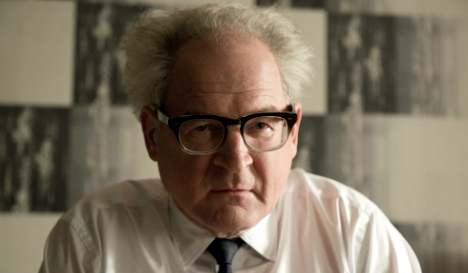A Jewish atheist and Social Democrat who spent time in a Nazi concentration camp before going into war-time exile, Bauer became “the most hated lawyer in Germany” after World War II, one of his biographers, Ronen Steinke, told AFP.
Honouring him on the big screen with the stories of his two biggest battles places him “finally back where he belongs: in the collective consciousness,” said Munich daily Sueddeutsche Zeitung.
“Labyrinth of Lies” by Giulio Ricciarelli – Germany's short-listed submission for Best Foreign Language Feature at February's Oscars – describes one of Bauer's chief accomplishments, bringing to justice 22 former Auschwitz officials in the 1960s.
The story focuses on a fictional young, idealistic public prosecutor who works under Bauer and fights against a conspiracy of silence and resistance in a judicial establishment still filled with ex-Nazis.
“Do you want every German to ask if their father was a murderer?” the young prosecutor is asked angrily in the movie. “Yes, that's exactly what I want,” he replies firmly. “I want these lies and this silence to end.”
Before the 1963-65 trial in Frankfurt, “a significant proportion of Germans believed the pictures of the (concentration) camps were Allied propaganda,” wrote prosecutor Erardo Cristoforo Rautenberg in news weekly Die Zeit.
Bauer “wanted to break the silence on the Nazi crimes” at a time when West German society during its economic miracle years “preferred to turn the page” on the horrors of the Holocaust, said Steinke.
In enemy territory
The target of hate mail, anti-Semitic phone calls and a bomb threat, Bauer, then the chief prosecutor of central Hesse state in Frankfurt, was also the subject of a “neo-Nazi plot to assassinate him”, said his biographer.
“In the Frankfurt courtroom, dogs had to search for explosives every morning,” Steinke said.
A second movie, “The People vs. Fritz Bauer” by Lars Kraume, released at Switzerland's Locarno International Film Festival, tells the story of how Bauer helped track down fugitive top Nazi Adolf Eichmann, known as the “architect of the Holocaust”, in Argentina.
The film portrays Bauer aged in his fifties – a stocky figure with a white mane, gruff manner and piercing eyes behind thick glasses – also evoking his rumoured homosexuality, at a time when sex between men was still punished with prison.
“As soon as I come out of my office, I enter enemy territory,” Bauer once said as he faced massive obstruction by lawyers who had served during the “Third Reich”, according to historian Werner Renz.
In 1957, in a deliberate act of “high treason” that could have landed him in jail, Bauer passed on to Israel's Mossad secret service information that led to the spectacular kidnapping of Eichmann.
Posthumous triumph
Eichmann was abducted by Israeli agents in Buenos Aires in 1960, convicted in 1961 and hanged in Israel a year later. For Bauer, it was only a partial victory: Eichmann did not face justice in Germany. Berlin had never requested the extradition of the top Nazi, whose testimony could have implicated former Nazi collaborators in high places.
The influence of Bauer – who was in 1933 interned in a concentration camp and then went into exile in Denmark and Sweden during the war – has continued to grow after his death, inside the courts and beyond.
His notion that the Nazi extermination camps were “collective enterprises of death”, where every “cog in the machine” shared part of the guilt, did not triumph at the Frankfurt trial.
But the principle was eventually confirmed by German courts in landmark trials of former Nazi camp guards almost 50 years later – at the 2011 trial of John Demjanjuk, and in this year's trial of Oskar Groening.
Bauer – a passionate teacher who passed “his confidence and hopes” onto a younger generation, according to Renz – was found dead in his bathtub in July 1968, under still unclear circumstances.
At the time, “a younger generation was preparing to demand the democratisation of society and a break with the authoritarian tradition of Germany”, a development to which the deceased prosecutor “had contributed like no-one else,” said Rautenberg.
A few months later, in November 1968, a young activist called Beate Klarsfeld slapped Germany's then chancellor Kurt Georg Kiesinger in parliament and called him a Nazi, an act that came to symbolise the 'house-cleaning' by Germany's post-war generation against their parents.



 Please whitelist us to continue reading.
Please whitelist us to continue reading.
Member comments